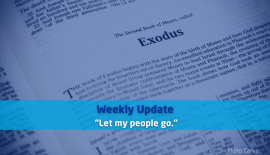Weekly Update: “Peace for our time”
When British Prime Minister Neville Chamberlain returned to London in September 1938 from talks with Hitler, holding in his hand the written Munich Agreement, he declared that he had achieved “peace for our time”.
“The settlement of the Czechoslovakian problem, which has now been achieved is, in my view, only the prelude to a larger settlement in which all Europe may find peace. This morning I had another talk with the German Chancellor, Herr Hitler, and here is the paper which bears his name upon it as well as mine. Some of you, perhaps, have already heard what it contains but I would just like to read it to you: … We regard the agreement signed last night and the Anglo-German Naval Agreement as symbolic of the desire of our two peoples never to go to war with one another again.”
Hitler, of course, had no intention of complying. Within a year, the world was at war.
Written peace agreements are not always worth the paper they are written on. Territorial or other “settlements” reached by foreign powers in response to the ideologically-driven threat of force by the aggressor to annihilate a third party are hardly the basis for long-term peace.
Are we witnessing a similar process in the negotiations with Iran? Iran’s consistent efforts to destabilize the region include threats to annihilate Israel (the small Satan). The US Administration intends to re-enter the Obama-negotiated JCPOA agreement with Iran, which limits but does not prevent Iran’s ability to develop nuclear weapons. President Joe Biden wants to bring the US back into the deal but only if Iran returns to full compliance. Iran is basically saying: “No, we don’t trust you, you go first. We will comply fully once sanctions are lifted.”
UN Secretary-General Guterres has weighed in this week, urging the US to lift sanctions on Iran and re-enter the JCPOA. “I continue to believe that a full restoration of the plan remains the best way to ensure that the nuclear program of the Islamic Republic of Iran remains exclusively peaceful.”
The US and UN are not directly threatened by Iran’s aggression, and threats of aggression. Israel is. Yet the new government also wants to be friends with the US.
Can Iran be trusted? As Dr. Kobi Michael explained in a recent webinar, Iran is preparing several places from which to be able to attack Israel. One of them is the Gaza Strip. Israel must manage all such existential threats simultaneously. Over recent years, in addition to dealing with Iran’s proxies Hezbollah (Lebanon) and Hamas (Gaza), Israel has launched cyber attacks, assassinations of nuclear scientists, and sabotage of Iran’s nuclear facilities.
In its negotiations with the US, Israel will surely not allow itself to be restricted in exercising its legitimate right to self-defence. Yet improving relations with the US are a core part of the new government’s strategy. Dr. Eric Mandel describes the dilemma and explores some of the options in his article in The Hill.
In the context of the foregoing, it is outrageous that former UN Secretary-General Ban Ki-Moon has published this week a piece in the Financial Times totally ignoring the existential threats facing Israel, accusing Israel of apartheid, and positioning Hamas as a victim of Israeli aggression.
Neither written agreements, nor prosecuting Israeli leaders for alleged “war crimes”, will bring peace in the Middle East. The real threat to peace comes from those who deny the right of the Jewish people to exist. It is the responsibility of the international community to do whatever is necessary to protect that right – even if that means conflict.
Peace depends, in the first instance, on mutual respect. Countries like UAE, Bahrain and Honduras are showing the way, by opening embassies and initiating cooperation with Israel.
The Editorial team
Israel & Christians Today
Will Israel accept ‘half a loaf’ on Iran’s nuclear program?
Dr. Eric Mandel in The Hill:
Despite the election of a zealot as Iran’s new president, Iran and the United States likely will return to the Joint Comprehensive Plan of Action, known as the JCPOA or the Iran nuclear agreement, with only minimal changes. So, what should Israel do? Will Bennett play hardball like former Prime Minister Benjamin Netanyahu and take a confrontational approach, or will Bennett decide that a conciliatory strategy is better?
> Read more..
UN head urges Biden to lift Iran sanctions
United Nations Secretary-General António Guterres also requested that the U.S. extend waivers on Iran’s oil trade and “nuclear non-proliferation projects.”
> Read more..
World powers must work to prevent Iran’s quest for hegemony
According to Dore Gold, president of the Jerusalem Center for Public Affairs (JCPA) and Israel’s former ambassador to the United Nations, while the threat of Iran obtaining nuclear weapons is considered the most dangerous threat associated with the Islamic Republic, it is also the least likely element of the Iranian arsenal to be used in the near future. Instead, Gold believes it is Iran’s proxies that represent the greatest threat today.
> Read more..
The obstacle to peace is not the “occupation”
In this Conversation, Dr. Kobi Michael (INSS) and Prof. Robbie Sabel (Hebrew University) explain why the “Oslo” model has failed. The main reasons are the Palestinian refusal to accept that the Jewish people have a right to national existence, the destabilizing involvement of Iran and other actors, plus conflicts within the Palestinian society. A new approach is needed. The Abraham Accords could provide a new model of cooperation.
Honduras becomes 4th country to open embassy in Jerusalem
Honduras officially moved its embassy in Israel to Jerusalem on Thursday in the presence of Prime Minister Naftali Bennett and visiting Honduran President Juan Orlando Hernández.
> Read more..
Israeli foreign minister opens UAE Embassy: ‘The Middle East is our home, we’re here to stay’
Lapid thanked the UAE’s leaders for their “vision and inspiration” as well as Israel’s former Prime Minister Benjamin Netanyahu, “the architect of the Abraham Accords,” former U.S. President Donald Trump and current U.S. President Joe Biden.
> Read more..
War and peace | The Signs of the Times with Rev. Willem J.J. Glashouwer
Has there ever been a time of real peace? Will there ever be a time of real peace?
Scripture for the week: 1 Thess. 5:1-3
Now, brothers and sisters, about times and dates we do not need to write to you,
2 for you know very well that the day of the Lord will come like a thief in the night.
3 While people are saying, “Peace and safety,” destruction will come on them suddenly, as labor pains on a pregnant woman, and they will not escape.





